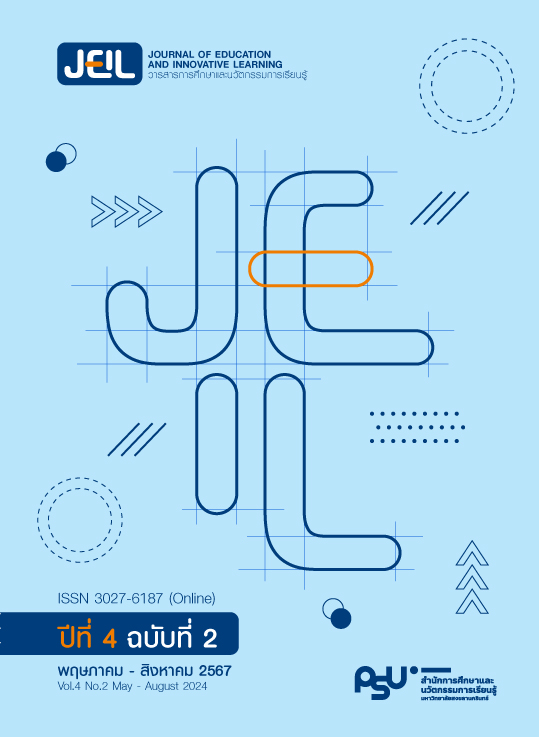การละเล่นไทยกับการเคลื่อนไหวแบบปานกลางถึงคล่องแคล่วว่องไว เพื่อส่งเสริมทักษะการเคลื่อนไหวพื้นฐานด้านทักษะการเคลื่อนที่จากจุดหนึ่งไปอีกจุดหนึ่ง ของนักเรียนชั้นประถมศึกษาปีที่ 1
Main Article Content
บทคัดย่อ
การวิจัยนี้มีวัตถุประสงค์เพื่อเปรียบเทียบผลการเข้าร่วมกิจกรรมการละเล่นไทยที่มีต่อ 1) ทักษะการเคลื่อนไหวพื้นฐานด้านทักษะการเคลื่อนที่จากจุดหนึ่งไปอีกจุดหนึ่ง โดยรวมของนักเรียนกลุ่มทดลองและกลุ่มควบคุม 2) ทักษะการเคลื่อนไหวพื้นฐานด้านทักษะการเคลื่อนที่จากจุดหนึ่งไปอีกจุดหนึ่ง รายด้านของนักเรียนกลุ่มทดลองก่อนและหลังการทดลอง กลุ่มตัวอย่างเป็นนักเรียนชั้นประถมศึกษาปีที่ 1 โรงเรียนบ้านกระทุ่มล้ม จำนวน 52 คน โดยเลือกแบบเจาะจง แบบแผนการวิจัยเป็นแบบอสมดุลยภาพมีกลุ่มควบคุมและเข้าร่วมกิจกรรมอย่างต่อเนื่อง เครื่องมือที่ใช้ในการวิจัย 1) แผนการจัดกิจกรรมการละเล่นไทย 12 แผน 2) แบบประเมินทักษะการเคลื่อนไหวพื้นฐาน The Test of Gross Motor Development-2nd edition มีค่าความเชื่อมั่นในการทดสอบสำหรับเด็กอายุ 6-7 ปีเท่ากับ .82 และอายุ 8 ปีเท่ากับ .76 การวิเคราะห์ข้อมูลโดยการทดสอบค่าทีแบบกลุ่มที่เป็นอิสระต่อกัน และการทดสอบค่าทีแบบกลุ่มที่ไม่เป็นอิสระต่อกัน ผลการวิจัยที่สอดคล้องกับวัตถุประสงค์การวิจัยพบว่า 1) ทักษะการเคลื่อนไหวพื้นฐานด้านทักษะการเคลื่อนที่จากจุดหนึ่งไปอีกจุดหนึ่ง โดยรวมของกลุ่มทดลองมีค่าสูงกว่ากลุ่มควบคุมอย่างมีนัยสำคัญทางสถิติที่ระดับ .001 2) ทักษะรายด้านของกลุ่มทดลองมีค่าสูงกว่าก่อนการทดลองอย่างมีนัยสำคัญทางสถิติ โดยทักษะการวิ่ง ทักษะการวิ่งท่าม้าควบ ทักษะการกระโดดแนวนอน ภายหลังการทดลอง 3 สัปดาห์ ทักษะการวิ่งก้าวขายาวข้าม ภายหลังการทดลอง 6 สัปดาห์ ส่วนทักษะการกระโดดขาเดียว และทักษะการวิ่งสไลด์ ภายหลังการทดลอง 9 สัปดาห์
Article Details

อนุญาตภายใต้เงื่อนไข Creative Commons Attribution-NonCommercial-NoDerivatives 4.0 International License.
เนื้อหาและข้อมูลในบทความที่ตีพิมพ์ในวารสารการศึกษาและนวัตกรรมการเรียนรู้ ถือเป็นข้อคิดเห็นและความรับผิดชอบของผู้เขียน ซึ่งกองบรรณาธิการวารสาร ไม่จำเป็นต้องเห็นด้วยหรือร่วมรับผิดชอบใด ๆ และไม่สงวนสิทธิ์การคัดลอกบทความเพื่อใช้ประโยชน์ทางวิชาการ แต่ให้อ้างอิงข้อมูลแสดงที่มาของบทความทุกครั้งที่นำไปใช้ประโยชน์
เอกสารอ้างอิง
Akbari, H., Abdoli, B., Shafizadehkenari, M., Khalaji, H., Hajihosseini, S., & Ziaee, V. (2009). The effect of Traditional games in Fundamental motor skill development in 7-9 years-old boys. Iranian Journal of Pediatrics, 19(2), 123-129. Retrieved from https://shura.shu.ac.uk/id/eprint/7143
Amornsriwatanakul, A., Lester, L., Bull, F. C., & Rosenberg, M. (2017). Are Thai children and youth sufficiently active? prevalence and correlates of physical activity from a nationally representative cross-sectional study. International Journal of Behavioral Nutrition and Physical Activity, 14, 72. doi:10.1186/s12966-017-0529-4
Barnett, L. M., Lai, S. K., Veldman, S. L. C., Hardy, L. L., Cliff, D. P., & Morgan, P. J., … Okely, A. D. (2016). Correlates of Gross Motor Competence in Children and Adolescents: A Systematic Review and Meta-Analysis. Sports Medicine, 46(11), 1663–1688. doi:10.1007/s40279-016-0495-z
Barnett, L. M., Morgan, P. J., Van Beurden, E., Ball, K., & Lubans, D. R. (2011). A Reverse Pathway? Actual and Perceived Skill Proficiency and Physical Activity. Medicine & Science in Sports & Exercise, 43(5), 898-904. doi:10.1249/MSS.0b013e3181fdfadd
Dubnewick, M., Hopper, T., Spence, J. C., & McHugh, T. L. F. (2018). “There’s a Cultural Pride Through Our Games”: Enhancing the Sport Experiences of Indigenous Youth in Canada Through Participation in Traditional Games. Journal of Sport and Social Issues, 42(4), 207-226. doi:10.1177/0193723518758456
Foulkes, J. D., Knowles, Z., Fairclough, S. J., Stratton, G., O’Dwyer, M., Ridgers, N. D., & Foweather, L. (2017). Effect of a 6-Week Active Play Intervention on Fundamental Movement Skill Competence of Preschool Children. Perceptual and Motor Skills, 124(2), 393-412. doi:10.1177/0031512516685200
Gallahue, D. L., & Ozmun, J. C. (2006). Understanding motor development: infants, children, adolescents, adults (6th ed.). New York: Mcgraw-Hill.
Ganpai, S., Yongyuan, B., & Seree, P. (2022). The effect of Thai traditional play participation on self-control in the first grade students. Srinakharinwirot Journal of Education, 23(1), 190-203. Retrieved from https://ejournals.swu.ac.th/index.php/jedu/article/view/14204 [in Thai]
Ginsburg, K. R., & Committee on Psychosocial Aspects of Child and Family Health. (2007). The importance of play in promoting healthy child development and maintaining strong parent-child bonds. Pediatrics, 119(1), 182-191. doi:10.1542/peds.2006-2697
Gliner, J. A., Morgan, G. A., & Leech, N. L. (2011). Research Methods in Applied Settings: An Integrated Approach to Design and Analysis (2nd ed.). Abingdon: Taylor & Francis.
Holfelder, B., & Schott, N. (2014). Relationship of fundamental movement skills and physical activity in children and adolescents: A systematic review. Psychology of Sport and Exercise, 15(4), 382-391. doi:10.1016/j.psychsport.2014.03.005
Khodaverdi, Z., Bahram, A., & Robinson, L. E. (2015). Correlates of physical activity behaviours in young Iranian girls. Child: Care, Health and Development, 41(6), 903-910. doi:10.1111/cch.12253
Komaratat, C. (2006a). Central Thai Folk Play Wisdoms. Bangkok: Satapornbooks. [in Thai]
Komaratat, C. (2006b). North Thai Folk Play Wisdoms. Bangkok: Satapornbooks. [in Thai]
Komaratat, C. (2006c). Northeast Thai Folk Play Wisdoms. Bangkok: Satapornbooks. [in Thai]
Komaratat, C. (2006d). South Thai Folk Play Wisdoms. Bangkok: Satapornbooks. [in Thai]
Lander, N., Eather, N., Morgan, P. J., Salmon, J., & Barnett, L. M. (2017). Characteristics of teacher training in school-based physical education interventions to improve fundamental movement skills and/or physical activity: A systematic review. Sports Medicine, 47(1), 135-161. doi:10.1007/s40279-016-0561-6
Lubans, D. R., Morgan, P. J., Weaver, K., Callister, R., Dewar, D. L., & Costigan, S. A., … Plotnikoff, R. C. (2012). Rationale and study protocol for the supporting children’s outcomes using rewards, exercise and skills (SCORES) group randomized controlled trial: A physical activity and fundamental movement skills intervention for primary schools in low-income communities. BMC Public Health, 12, 427. doi:10.1186/1471-2458-12-427
Morgan, P. J., Barnett, L. M., Cliff, D. P., Okely, A. D., Scott, H. A., Cohen, K. E., & Lubans, D. R. (2013). Fundamental movement skill interventions in youth: A systematic review and meta-analysis. Pediatrics, 132(5), e1361-e1383. doi:10.1542/peds.2013-1167
Murni, S. (2019). Playing to prepare for adulthood: The games of Kanome children. e-Bangi, 16(4), 1-12.
Nahuanin, C., Palintorn, N., Chaiyakan, A., & Boodsabong, C. (2020). The use of Thai children traditional games activities for early childhood’s gross motor skills development. Journal of MCU Ubon Review, 5(3), 379-390. Retrieved from https://so06.tci-thaijo.org/index.php/mcjou/article/view/245276 [in Thai]
Nampai, U., & Mawinthorn, W. (2022). Fundamental motor skills for children in the school. Journal of Kasetsart Educational Review, 37(2), 148-153. Retrieved from https://so04.tci-thaijo.org/index.php/eduku/article/view/258939 [in Thai]
Riethmuller, A. M., Jones, R. A., & Okely, A. D. (2009). Efficacy of interventions to improve motor development in young children: A systematic review. Pediatrics, 124(4), e782-e792. doi:10.1542/peds.2009-0333
Sanewong, A., & Kanjanasorn, W. (2017). The effect of applied Thai traditional play on physical fitness and body mass index in overweight students, demonstration school of Udonthani Rajabhat university. Journal of Education (Graduate Studies Research) Khon Kaen University, 11(2), 265-274. Retrieved from https://so02.tci-thaijo.org/index.php/EDGKKUJ/article/view/113617 [in Thai].
Ulrich, D. A. (2000). Test of gross motor development examiner’s manual (2nd ed.). Austin, Texas: Pro.Ed.
Vasileva, M., Bakeva, V., Vasileva-Stojanovska, T., Malinovski, T., & Trajkovik, V. (2014). Grandma’s games project: Bridging tradition and technology mediated education. TEM Journal, 3(1), 13-21.
World Health Organization. (2010). Global recommendations on physical Activity for health. Switzerland: World Health Organization.
Wutichat, S., Tanpanich, T., & Makaje, N. (2022). Fundamental movement skills to fundamental sports skills for children. Journal of Liberal Arts and Management Science Kasetsart University, 9(2), 1-14. Retrieved from https://kuojs.lib.ku.ac.th/index.php/jfam/article/view/4794 [in Thai]
Yongyuan, B., Songsiri, N., & Pittatano, N. (2018). Effects of participating with Thai traditional play activities on creative thinking in preschooler. Silpakorn Education Research Journal, 11(1), 83-99. Retrieved from https://so05.tci-thaijo.org/index.php/suedureasearchjournal/article/view/159762 [in Thai]


